- Home
- Andrew Wareham
Britannia’s Son (The Duty and Destiny Series, Book 4) Page 2
Britannia’s Son (The Duty and Destiny Series, Book 4) Read online
Page 2
This sally brought much louder laughter – contempt for politicians united every decent person in that age.
The ladies retired and the gentlemen clustered together at the head of the table, Taylor flanked by his eldest son, a man in his twenties, Partington next to his heir, Robinson and Frederick to either side, decanters circulating.
“Income Tax, Sir Frederick! What next? A wicked imposition!”
“It will pay for the war, Sir Geoffrey, and the war pushes up the price of corn, and that makes for higher rents, and the rents provide the income that is taxed! No war, no Income Tax, but much less income to tax, either!”
“Do you know, Sir Frederick, that is quite true! I had never thought of it, but the war has made me much richer – and our enclosure has helped, sir.”
Robinson, who felt that Finance was his particular field, agreed wholeheartedly, but regretted still that there seemed no prospect of an end to the war now that Mr Pitt’s latest secret initiative had been disclosed and had failed.
They agreed, and conversation moved on to parish business – the roads, as always, and a soon to be orphaned family of twelve children, mother recently dead, father taken to the bottle and fallen under a wagon, his back, pelvis and upper legs smashed, failing fast – briefly dealt with. The roads would be mended after harvest they agreed, if possible, if the weather permitted, some loads of broken stone to the wettest parts, ditches to be deepened elsewhere. For their orphans, there was a spare cottage on one of Frederick’s Home Farms, the eldest daughter to take on the house and garden, the girls as they grew old enough to go into service, the boys to be disposed of, the intelligent to be bought apprenticeships, the others to go sea or the army as they reached an age, a dole of beef and bread and cheese and milk and a few pence a week for dame school the meanwhile, all as it always had been. The young men, although much of an age with Frederick, were conscious of their cadet status and said nothing until Partington’s heir diffidently entered a break in the talk.
“Sir Frederick, might I beg the favour of your advice, sir? You are a man with a separate profession, as it were, can perhaps offer me another perspective.”
“With pleasure, Mr Hackett! I am ever happy to give advice, and find, as somebody or the other said, that my prescriptions are often far wiser than my own actions have been! How can I help you?”
“My future, sir – I have some doubts over what I must do, sir, but suspect I must make a radical change in my plans. I have sat my terms at Oxford, sir, and am now in my fourth year. It had been my intention to take Holy Orders and then seek a Fellowship.”
“You are speaking to a man who went to sea at age ten, sir! Please explain.”
“I would have become a don, Sir Frederick, a member of the staff of my college – one must be ordained in the Church to do so.”
“I presume it provides a living?”
“Small but adequate, Sir Frederick, and I love the learning!”
“I see – when you were heir to a small estate, mostly investments rather than land, I presume, it was not inappropriate. Would you marry?”
“Dons do not, Sir Frederick.”
“And the estate would then devolve on your sisters and their children.”
“Quite so, sir – but now, sir, instead of a gentleman’s inheritance, I am to be Lord Partington one day, though not for many years, I trust!”
Frederick refilled his glass, moved the decanter on its round, sipped abstemiously. He could not love port.
“The name demands an heir, Mr Hackett, it imposes a duty upon you, I believe, the more particularly in the circumstances you have inherited, sir – and to which, of course, I regret to say, I contributed! I believe you have no choice, sir. The estate has duties which you must meet, and in which you should learn to take pleasure. You must not go back to Oxford, sir, except as a visitor, you cannot become a, a ‘don’, was it? Learn the land instead, sir – ride and fish and shoot, a little or a lot, as you will. Speak to your people and discover your responsibilities to them, and theirs to you. Talk to the young ladies as well, and find a wife, for, of course, there must be an heir. As well, sir, remember that you will sit in the Lords, one day – discover something, a little or a lot, about the governance of this land of ours, for some share in it will be yours!”
Frederick smiled, apologised for sermonising. “Sir Geoffrey, are there Assemblies locally?”
“In Bridport on the second Tuesday and in Dorchester on the fourth of each month, Sir Frederick.”
“Then, gentlemen, let us play our part in County Society, and introduce ourselves, our sons and the grown-up girls to the locality! Let us go to Dorchester next week and Bridport a fortnight after.”
“But, Sir Frederick, I have never really learned to dance!”
“You have ten days and two sisters, young man!”
It occurred again to Frederick that ‘young’ Hackett was in reality very little removed from his own age – he had evidently led a sheltered life.
They left their port, ambled through to join the ladies in the withdrawing room.
“Sir Geoffrey, your pianoforte, is it in tune?”
“It is, Sir Frederick, though my girls never showed the least aptitude. Why, sir?”
“I saw Miss Hackett eying the instrument with an undisguised longing, sir.”
The function of the misses was to entertain after dinner, to play or sing. Miss Hackett was rapidly disposed at the piano.
London Bach; Clementi; Scarlatti, her touch delicate, precise, hailstones pattering on window panes; Greensleeves for the more homely; Ladies of Spain in homage to the Navy, singing to her own playing in a thin but true soprano.
“Would you play ‘An Alehouse in the Town’, Miss Hackett? We had a trumpeter, Smudger Smith, on Athene, gave us that as we advanced on Hercule in the West Indies.”
“Did he survive, Sir Frederick?” Taylor asked, aware from his naval son of just how perilous an encounter it had been.
“He did not, sir.”
Memories flooded back – of Athene, of Marianne – not all sad – he could remember the joy as well, now. His mourning was finally over, he could move onwards, at last – he was sufficiently self-aware to suspect that it was no coincidence that this should become apparent on the day he met Miss Hackett, and he was too little the introvert to allow this to drive him away.
The project of the Assembly was mentioned, found favour with the ladies, became an engagement to be entered into their tablets.
“Will you dance at Dorchester, Sir Frederick?”
“Not this month, Miss Hackett, nor for the next several, I suspect, not one armed and lacking my balance! Early in the New Year, I expect, and hope, ma’am, and then, I shall beg that you will partner me?”
“The very first pair that you dance, Sir Frederick, are mine!”
He bowed, she curtsied, both laughed.
“Miss Charlotte does not play the piano, I believe. Was it a ‘cello I heard, ma’am?”
“A viola, sir,” she murmured in reply.
“And is more accomplished on it than I on the piano, sir.”
“Then she is truly a virtuosa, ma’am!”
Notes were exchanged and the four families met for the Assembly, descending on Dorchester, four carriages in convoy drawing up before the imposing frontage of the Rooms. The local availability of white Portland stone had resulted in a rash of pseudo- and neo-classical false fronts of varying success and legitimacy, the Rooms being one of the larger, if not more tasteful, examples. They were recognised, made very welcome by Mr Parker, the Master of Ceremonies, happy indeed at the addition of an unexpected Peer of the Realm, two titled commoners and the long established doyen of the merchant community. The word was very rapidly spread through the gathering of local and County worthies, all of whom were delighted at the additional distinction offered their respectable, provincial assembly.
The first country dances struck up at eight o’clock exactly and the party was absorbed into the business of
the evening, with the exception of Frederick, who had informed Mr Parker of his inability whilst wounded. Theirs was a military and naval community, most families having a son or brother serving in army, navy or, less worthily, the Militia, and wounded officers were not uncommon, returned home on furlough. There was a card room and a separate lounge for their use, and for the elderly and valetudinarian who could not face the exertions of stepping out. Frederick retired to quiet obscurity, he hoped, discovered again that he was too well-known a figure to achieve solitude.
“No partner, Miss Hackett?” Frederick enquired in mock horror in the second hour, the third pair of dances just forming and she standing uncertainly in the door to the lounge.
“I refused one, Sir Frederick – no mean sacrifice to one who has danced too little in recent years! I wondered if perhaps you might enjoy a conversation, a protection from the tuft-hunters!” She spoke lightly, smiled nervously, scanning his face to see if she intruded.
“If one more worthy gentleman, or overpowering lady, had said ‘cannibal’ or ‘Wicked Revolutionaries’ then I fear I might have been moved to violence. Shall we take a seat away from the noise, may I fetch you a refreshment?”
She accepted lemonade and a seat in the corner.
“What is this I hear of a turnpike, sir? Papa seems much in its favour.”
“From Bridport to Dorchester to Poole, ma’am. The fleet blockading Brest makes Bridport its rendezvous when driven off station, and, as this is always in time of storm, the stores it needs must come by road. We need a turnpike that may be traversed in the worst of weather. The benefit to us will be considerable.”
“And they will have no other route, must pay us to travel our roads, ourselves profiting from the country’s need, sir!”
“From private contractors only, ma’am – servants of the Crown travel toll-free.”
Her brow cleared, the frown replaced by her broad smile. “So they do, sir, as they should. When?”
“This winter – there is a gang of navigators working a quay in Bridport who will be finished soon after harvest. Most years the men must overwinter on their savings, such as they are in their way of life, and go into debt to their contractor so that they must work for him again in the spring. It is well paid, but they are not wholly free as a result. This year Mr Hartley has talked with their ganger and they will work for him, guaranteed half of their week’s pay whether they can get onto the road or not – rain or shine – and on a bonus for miles completed that should make their wages up almost to the amount they can expect at the height of summer. Experience shows, ma’am, that sepoys work better than slaves and paying a higher wage produces greater output.”
“But, Sir Frederick, will not excess money merely lead to vice? While they can buy their daily bread, and a modicum of meats perhaps, they will live abstemious, virtuous lives – but if we pay them too much, surely we merely put them in the way of temptation. We have a duty to those set beneath us, sir!”
Frederick smiled in his turn – he had memories of the Master of the Athene, a Norfolk Dissenter – saying much the same, while accepting his share of their prize-money on the grounds that he understood how to be virtuous.
“Many of them will send money home to their families, their parents, their brothers’ and sisters’ children. Particularly, I am told, amongst the Irish, their incomes will aid a whole village. Others who have no kin will save for their old age. Some buy books. Too many drink and patronise all forms of sin. Should I penalise the good men because others are evil?”
She had no answer, the Chapel had not considered more complex aspects of the question of wages – the mine-owners and manufacturers who provided their funds and respectability wanted to hear only one side of the case.
“Will the road follow the river, sir?”
“Part way up the valley side, Miss Hackett, drier but still sheltered by the hills.”
The mechanics of the turnpike occupied them their whole half-hour, its imitation of the best of Roman practices fascinating both, their heads coming close together as they talked, keeping outsiders at bay.
Despite the irritations of the underbred Frederick found he had greatly enjoyed his evening and made it his business to accidentally meet Miss Hackett about the parish and on her daily rides, fondly imagining that his interest was unnoticed amongst his people or hers.
The Robinsons broached the prospect of dinner, were encouraged to send out their cards, were assured they would not be seen as ‘encroaching’. They were able to add a yellow admiral and a retired colonel of the Dorsets to provide leaven to the familiar party.
“Sir Frederick Harris? My pleasure, sir. The Naval Gazette has a report, sir, on your action with Rashid Hassan Bey. I presume you have read it?”
“No, Admiral, I was not aware that it was to be made public.”
“Good work, well commented on, together with an announcement that you are invalided for a year or two. I presume you will turn your endeavours towards the political field now, Sir Frederick – there is little more for you to gain from a naval career.”
The sneer was overt, the Admiral restrained only by the basic courtesies demanded at another’s dinner table. Possibly he was simply jealous, his own career over and resentful of a captain more successful than he. Perhaps he was a member of a family whose toes Frederick had trodden on. He might even, simply, be a Whig, like the horrible Jervis whose star was in the ascendant, it seemed, was threatened as First Lord if Pitt and his Tories fell.
“I shall take whatever command is offered me, Admiral, the instant my doctors permit me to serve again. We are at war, sir, and must, I believe, perform the duties demanded of us.”
The Admiral bridled, resentful ever of his yellowing, of the fact that he was judged to be of no further value to the service, that nothing more would ever be demanded of him. The port circulated and Robinson brought them away early, sensitive to the undercurrents and wanting no quarrel in his house. The ladies were gossiping noisily, the men instantly joining the chatter, Miss Hackett not to be seen but a thread of music was coming from the library across the hall. Frederick wandered quietly out of the door, took a position where he could see and hear clearly, leaning against a bookshelf. He waited until London Bach ended, listening, watching her every move – the piano stool was kind to her figure, disguising the fullness of her hips and showing chest to its greatest advantage – and her face, part shadowed, lost in concentration, fixed itself in his memory, an image never to be lost. She looked up, smiling for him, responding with a delighted grin to his obvious admiration.
“Mr Robinson has some very interesting music, sir, there is some Mozart here which I would love to attempt, but which I must study first – I wish I possessed a copy!”
“When next you visit London, ma’am, it will be possible to make the purchase.”
“Papa does not intend to take me to Town until next year, I believe. He will bring Charlotte out the year after, he says, but cannot do so for either of us immediately.”
The cost was obviously prohibitive in the short run – the late lord had had expensive tastes and his bills, which must be met, would still be rolling in. She might not have to rely upon her father, however – a shopping expedition with a new husband was only to be expected – she seemed to have a liking for his company, and he had more than a liking for her. Time to move things on a pace, perhaps.
“There is much to be done here on our estates, Miss Hackett, before London can be thought of – my Mr Hartley is hoping to complete the first big cut along the river before harvest. I shall ride out in the morning to inspect his progress, I believe.”
“I take exercise every dry morning before noon, Sir Frederick.”
“Perhaps we may meet then, ma’am!”
“I’ll take the hunter out this morning, Bosomtwi.”
“I ride with you, sir.”
“I wish to be alone, Bosomtwi.”
“You rides Lightning out, I am with you on Thunder, isn’t it, sir. That a s
trong blood horse, sir, isn’t it.”
“And I am a weak rider!”
“That right, sir! Now, that arm of yours ain’t strong enough if he get away, sir.”
“I have a reason to be alone, Bosomtwi.”
It irritated Frederick to be reduced to pleading, particularly when he suspected Bosomtwi would be afflicted with deaf ears.
“Good, sir – she a really lovely lady, that Miss Hackett.”
“God damn it! I’ll take the cob.”
“Very good, sir.”
The cut was three quarters of a mile of canal or broad ditch, arrow straight through the middle of a lazy ‘S’ in the river, its aim being to speed up the flow of water, to pass a greater volume through in any given time and so to drain out the stagnant pools, to lower the water table and turn bog first into rough pasture, eventually into sweet water meadows.
Frederick on his cob met Miss Hackett on her ancient pony – both commenting on the fortunate coincidence – and rode the length of the working, coming across an exultant, mud-splashed Hartley who announced that the big slough had fallen four inches in twenty four hours without rain, would be gone in a month.
“Before your wedding, Mr Hartley?”
“Not quite, sir, first banns were called in Trowbridge last Sunday, sir.”
“Good – I am sorry I will not be able to attend, but a cross-country journey might still not be wise for me.”
“Of course, Sir Frederick – we wish you could be there, but it would not be sensible in you to do otherwise. You will meet Mrs Hartley, sir, two days after the wedding, when we take up residence in your gift!”
“Weddings are in the air, it seems, sir,” Miss Hackett idly commented, saying that three of her father’s tenants would be standing in church over the next month.
“It is easier for the land-bound, ma’am,” he replied, “but a sailor’s wife has to live with separation for years at a time – it is a lot to ask of any lady.”
“But not too much, Sir Frederick.”

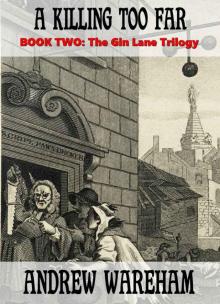 A Killing Too Far
A Killing Too Far Killing's Reward
Killing's Reward A New Place
A New Place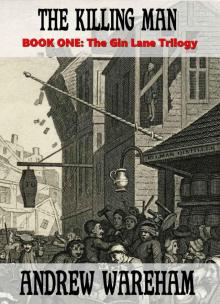 The Killing Man
The Killing Man Bold and Blooded
Bold and Blooded The Breaking Storm (Innocent No More Series, Book 2)
The Breaking Storm (Innocent No More Series, Book 2) Nobody’s Child
Nobody’s Child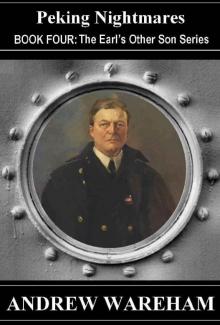 04 Peking Nightmares (The Earl’s Other Son Series, #4)
04 Peking Nightmares (The Earl’s Other Son Series, #4)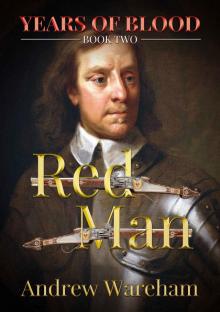 Red Man
Red Man Foreign Mud
Foreign Mud The Gathering Clouds (Innocent No More Series, Book 1)
The Gathering Clouds (Innocent No More Series, Book 1) 06 A Soldier’s Farewell (Man of Conflict #6)
06 A Soldier’s Farewell (Man of Conflict #6) Chinese Whispers
Chinese Whispers 02 Shanghai Dreams (The Earl’s Other Son #2)
02 Shanghai Dreams (The Earl’s Other Son #2) Hungry Harry: An Orphan in the Ranks
Hungry Harry: An Orphan in the Ranks A Wretched Victory (Innocents At War Series, Book 6)
A Wretched Victory (Innocents At War Series, Book 6)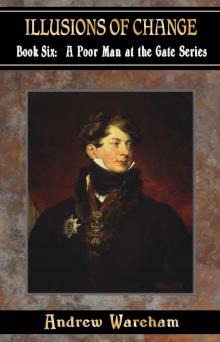 Illusions Of Change (A Poor Man at the Gate Series Book 6)
Illusions Of Change (A Poor Man at the Gate Series Book 6)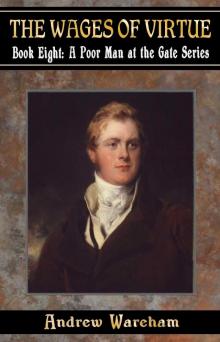 The Wages Of Virtue (A Poor Man at the Gate Series, Book 8)
The Wages Of Virtue (A Poor Man at the Gate Series, Book 8) Blood and Famine (Man of Conflict Series, Book 4)
Blood and Famine (Man of Conflict Series, Book 4) The Friendly Sea (The Duty and Destiny Series, Book 1)
The Friendly Sea (The Duty and Destiny Series, Book 1) Bursting Balloons (Innocents At War Series, Book 5)
Bursting Balloons (Innocents At War Series, Book 5) The Death of Hope
The Death of Hope Deadly Shores (The Duty and Destiny Series, Book 11)
Deadly Shores (The Duty and Destiny Series, Book 11) The Vice Of Virtue (A Poor Man At The Gate Series Book 10)
The Vice Of Virtue (A Poor Man At The Gate Series Book 10) Virtue’s Reward (A Poor Man at the Gate Series, Book 11)
Virtue’s Reward (A Poor Man at the Gate Series, Book 11) A Deadly Caper (Innocents At War Series, Book 2)
A Deadly Caper (Innocents At War Series, Book 2)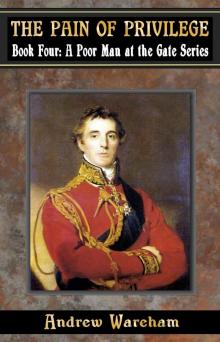 The Pain Of Privilege (A Poor Man at the Gate Series Book 4)
The Pain Of Privilege (A Poor Man at the Gate Series Book 4) Far Foreign (The Duty and Destiny Series, Book 9)
Far Foreign (The Duty and Destiny Series, Book 9)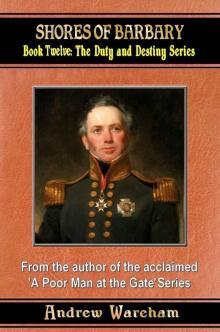 Shores of Barbary (The Duty and Destiny Series, Book 12)
Shores of Barbary (The Duty and Destiny Series, Book 12)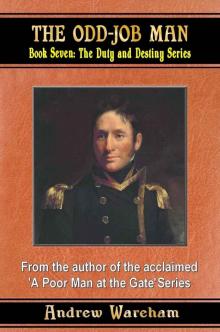 The Odd-Job Man (The Duty and Destiny Series, Book 7)
The Odd-Job Man (The Duty and Destiny Series, Book 7) Fire and Folly (Man of Conflict Series Book 3)
Fire and Folly (Man of Conflict Series Book 3)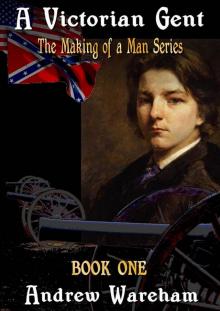 A Victorian Gent (The Making of a Man Series, Book 1)
A Victorian Gent (The Making of a Man Series, Book 1)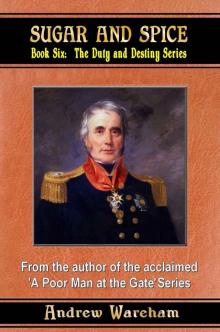 Sugar and Spice (The Duty and Destiny Series, Book 6)
Sugar and Spice (The Duty and Destiny Series, Book 6) Dark Days Of Summer (Innocents At War Series, Book 4)
Dark Days Of Summer (Innocents At War Series, Book 4) Dire Shenanigans (The Making of a Man Series, Book 2)
Dire Shenanigans (The Making of a Man Series, Book 2) The Fuzzy-Wuzzy Man (The Duty and Destiny Series, Book 3)
The Fuzzy-Wuzzy Man (The Duty and Destiny Series, Book 3)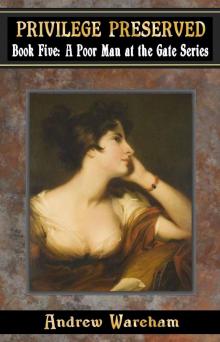 Privilege Preserved (A Poor Man at the Gate Series Book 5)
Privilege Preserved (A Poor Man at the Gate Series Book 5) No Longer A Game (Innocents At War Series, Book 3)
No Longer A Game (Innocents At War Series, Book 3)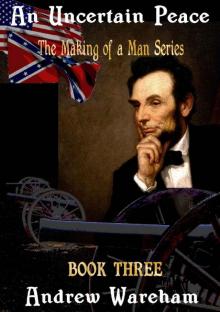 An Uncertain Peace (The Making of a Man Series, Book 3)
An Uncertain Peace (The Making of a Man Series, Book 3)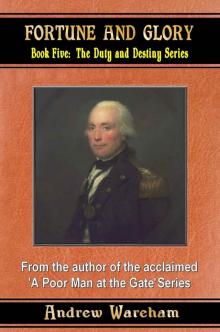 Fortune And Glory (The Duty and Destiny Series, Book 5)
Fortune And Glory (The Duty and Destiny Series, Book 5) The Old Order (A Poor Man at the Gate Series Book 7)
The Old Order (A Poor Man at the Gate Series Book 7) A Place Called Home (Cannibal Country Trilogy, Book 2)
A Place Called Home (Cannibal Country Trilogy, Book 2) Nouveau Riche (A Poor Man at the Gate Series, Book 2)
Nouveau Riche (A Poor Man at the Gate Series, Book 2) The Privateersman (A Poor Man at the Gate Series Book 1)
The Privateersman (A Poor Man at the Gate Series Book 1) Britannia’s Son (The Duty and Destiny Series, Book 4)
Britannia’s Son (The Duty and Destiny Series, Book 4) Long Way Place (Cannibal Country Trilogy, Book 1)
Long Way Place (Cannibal Country Trilogy, Book 1) Spanish Tricks (Man of Conflict Series, Book 5)
Spanish Tricks (Man of Conflict Series, Book 5) A Parade Of Virtue (A Poor Man At The Gate Series Book 9)
A Parade Of Virtue (A Poor Man At The Gate Series Book 9)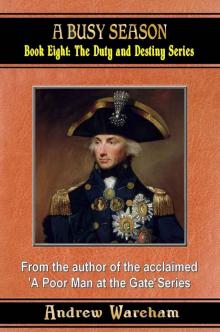 A Busy Season (The Duty and Destiny Series, Book 8)
A Busy Season (The Duty and Destiny Series, Book 8) Billy Bacon and the Soldier Slaves (Colonial Warrior Series, Book 1)
Billy Bacon and the Soldier Slaves (Colonial Warrior Series, Book 1) Raging Rajahs (Man of Conflict Series, Book 2)
Raging Rajahs (Man of Conflict Series, Book 2)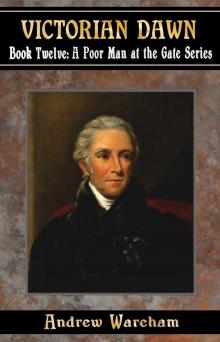 Victorian Dawn (A Poor Man at the Gate Series, Book 12)
Victorian Dawn (A Poor Man at the Gate Series, Book 12) Born To Privilege (A Poor Man at the Gate Series Book 3)
Born To Privilege (A Poor Man at the Gate Series Book 3) The Soldier Brat (Man of Conflict Series, Book 1)
The Soldier Brat (Man of Conflict Series, Book 1)